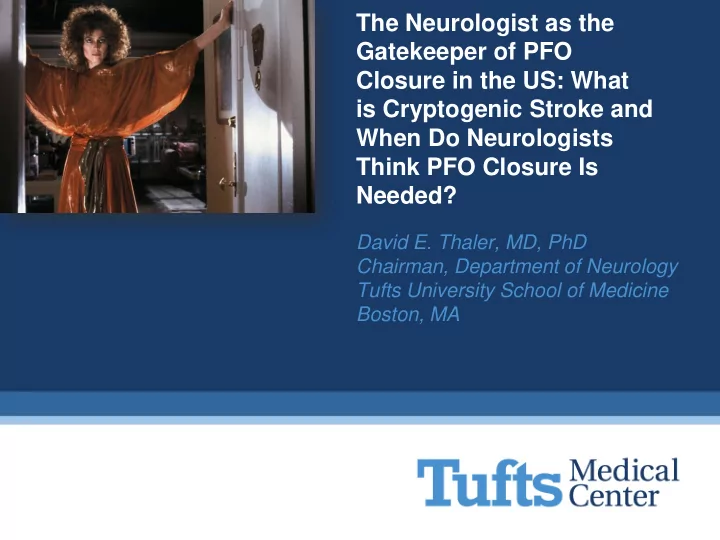

The Neurologist as the Gatekeeper of PFO Closure in the US: What is Cryptogenic Stroke and When Do Neurologists Think PFO Closure Is Needed? David E. Thaler, MD, PhD Chairman, Department of Neurology Tufts University School of Medicine Boston, MA
Disclosure Statement of Financial Interest Within the past 12 months, I or my spouse/partner have had a financial interest/arrangement or affiliation with the organization(s) listed below. Affiliation/Financial Relationship Company • Grant/Research Support • Consulting Fees/Honoraria • Steering Committee, RESPECT Trial, St Jude • Major Stock Shareholder/Equity Medical • Royalty Income • Ownership/Founder • Intellectual Property Rights • Other
Pt M – 30 y/o F with BRAO 16hrs after airplane flight and PFO
30 mins s/p apraclonidine drops Final diagnosis: Left ICA dissection and retinal embolism … and incidental PFO
What is the underlying mechanism? “Stroke is an observation not a diagnosis”
Common mechanisms of cerebral ischemia • “Small vessel disease” - lipohyalinosis • Embolism – Artery-to-artery (carotid, aorta, other) – Cardiac source – Paradoxical • Decreased perfusion through a fixed stenosis
Other causes of cerebral ischemia • Vasculitis • Collagen vascular diseases : isolated angiitis of the CNS, temporal (giant cell) arteritis, polyarteritis nodosa, Wegener's granulomatosis, Takayasu's arteritis, syphilis • Meningitis : tuberculosis, fungi, syphilis, bacteria, herpes zoster • Arterial dissection : carotid, vertebral, basal intracranial arteries • Hematologic disorders : polycythemia, thrombocytosis, thrombotic thrombocytopenic purpura, disseminated intravascular coagulation, dysproteinemias, hemoglobinopathies (sickle cell disease) • Miscellaneous : cocaine, amphetamines, moyamoya disease, fibromuscular dysplasia, CADASIL • Hypercoagulable states : secondary to systemic disease, carcinoma (especially pancreatic), eclampsia, oral contraceptives, lupus, factor C or S deficiency, factor V mutation, etc. • V asospasm : following subarachnoid hemorrhage • Reversible cerebral vasoconstriction : idiopathic, eclampsia, trauma • Venous : Dehydration, pericranial infection, postpartum and postoperative states, systemic cancer
Stroke mimics and chameleons Lancet Neurol 2011, 10: 550-60
Stroke mimics • Migraine • Panic attack • Seizure • Hypoglycemia • Subdural hematoma • Demyelinating disease • Tumor • Amyloid angiopathy • Syncope • Brain abscess • Cardiac arrhythmia • Encephalitis
Stroke chameleons Condition Prevalence Altered mental status 31% Syncope 16% Hypertensive emergency 13% Systemic infection 11% Suspected acute coronary syndrome 10% Other (seizure, peripheral vertigo, cord compression, 20% myasthenia gravis, Bell palsy, migraine, hypoglycemia) J Stroke Cerebrovasc Dis 2014 23: 374-378
Do I know what “neurologists” think?
Authors by specialty Neurology Internal Med/Cardiology Other Ovbiagele Kernan (IM) Heck: Radiology Chimowitz Black (IM) Mitchell: Nursing Fisher Bravata(IM) Richardson: Statistician Furie Ezekowitz (C) Wilson: Neurosurgery Johnston Fang (IM) Hepburn-Smith: Nursing Kasner Rich (C) Mack: Neurosurgery Kittner Panagos: ED Schwamm Gorman Rabinstein n=10 n=6 n=7
Classification of Recommendations and Level of Evidence
2011 2014
Classification of Recommendations and Level of Evidence 2011 2014
Recommendation should be changed • Class III definition changed • Committee erred in interpreting “negative trials” • Evidence using the committee’s own words support at least IIb
It may never come to this... CARDIOLOGIST NEUROLOGIST Slide courtesy of Vincent Thijs, MD
Suggestions Neurologists and cardiologists must collaborate 1. Involve neurologists in the diagnosis of stroke 2. Exclude other common “cryptogenic” causes: PAF, aortic 3. atheroma, lacunes Not every dizzy spell is a TIA 4. Continue aggressive risk factor modification after closure 5. Continue antithrombotic medication after closure 6. Involve patients in the decision making 7. Intersociety position statements 8.
Recommend
More recommend